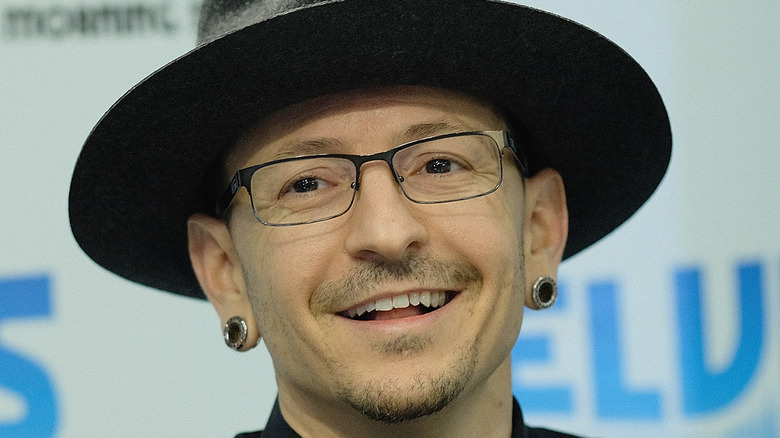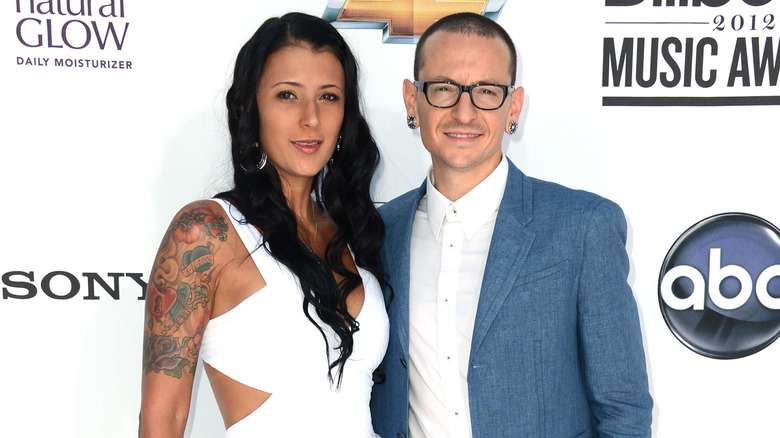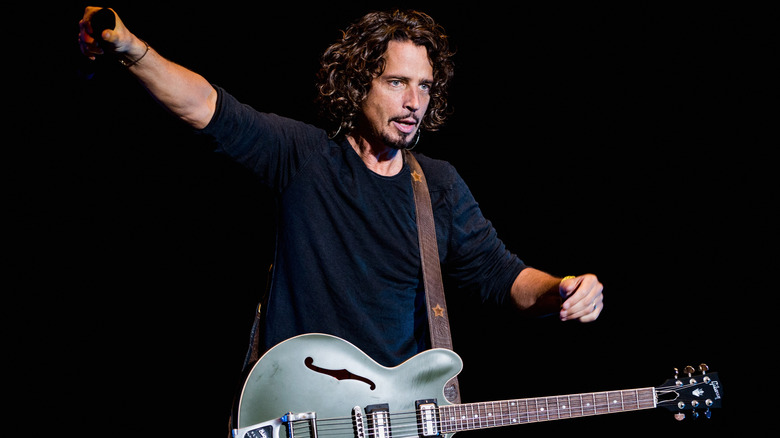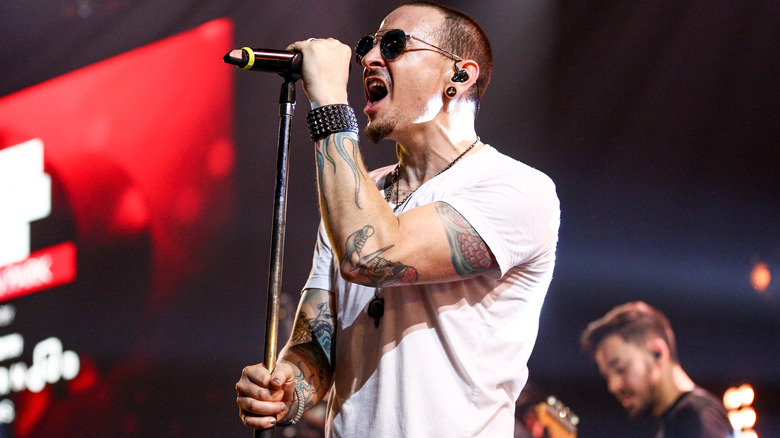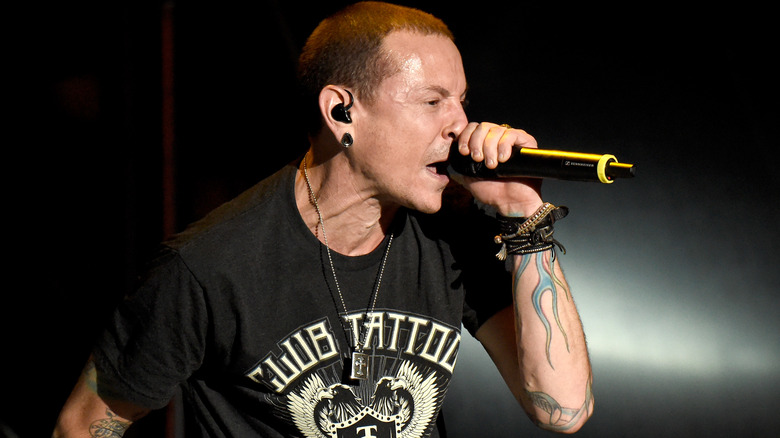The Tragic Death Of Chester Bennington Explained
Modern rock music lost one of its most talented vocalists on July 20, 2017, when Linkin Park's Chester Bennington was found dead at his Palos Verdes, California, home from an apparent suicide. Frequently teaming up on lead vocals with bandmate Mike Shinoda, Bennington powered many of the biggest rock hits of the 2000s, including, but definitely not limited to "Crawling," "In the End," and "Numb." Aside from his work with Linkin Park, the musician also fronted Stone Temple Pilots for a few years after the band fired longtime lead singer Scott Weiland in 2013.
Following his two-year stint with STP, Bennington shifted his focus back to Linkin Park as he and his bandmates worked on the album that would become "One More Light." Released on May 19, 2017, "One More Light" was a notable diversion for the band as they eschewed most of their rock, metal, and rap influences and released something that outlets such as NME described as more of a pop album than anything else. NME was also one of the many publications that gave the album harsh reviews, calling the record a "contrived" attempt to keep up with younger, more contemporary indie-pop bands.
Little more than two months after "One More Life" arrived, Chester Bennington was dead at just 41 years of age.
If you or anyone you know is having suicidal thoughts, please call the National Suicide Prevention Lifeline at 1-800-273-TALK (8255).
Bennington's widow said she missed the warning signs
Chester Bennington had dealt with depression for huge chunks of his life — this was evident in the lyrics of many Linkin Park songs, and as his widow, Talinda Bennington, recalled in an interview with CNN's Anderson Cooper, his frequent feelings of hopelessness and isolation and unexplained changes in behavior had become "part of [their] daily life" as a family. "Sometimes, some signs were there more than others," she continued. "Sometimes, they weren't there at all."
Talinda went on to explain that her husband was seemingly "at his best" on the night before his death. "We were on a family vacation, and he decided to go back home to do a television commercial," she added. "This was not a time where we or any of our family suspected this to happen, which is terrifying. ... We thought everything was OK."
Looking back on why she felt she missed the warning signs in her husband, Talinda Bennington told Cooper that she "could not relate" to how Chester was processing his depression, given that she had never personally suffered from the condition. She stressed, however, that Chester's death pushed her to educate herself on the reasons why people suffer from depression and how their loved ones can help them through the tough times. "If we can find good coping mechanisms, if we have people we trust that we can talk to, that helps us to make better choices for ourselves," she related. "And my husband didn't have that in a lot of situations."
Links to Chris Cornell and his earlier death by suicide
In the days that followed Chester Bennington's death, many fans had noticed that his passing had some links to another iconic vocalist who recently died by suicide — Soundgarden/Temple of the Dog/Audioslave frontman Chris Cornell. As pointed out by The Washington Post, Bennington died on what was supposed to be Cornell's 53rd birthday, almost exactly two months after the grunge legend died following a Soundgarden concert in Detroit. The Wrap also noted that both frontmen used the same method when they took their own lives.
Although their bands played different sub-genres of rock music and the two singers were more than a decade apart in age, Bennington and Cornell became fast friends after Cornell, then performing as a solo artist, opened for Linkin Park during their tour of Australia in 2007. Both men would frequently team up on stage while on tour, with Cornell doing guest vocals on Linkin Park's "Crawling" and Bennington duetting with Cornell when the latter would cover Temple of the Dog's anthemic "Hunger Strike." Following Cornell's death in May 2017, Bennington took to social media and shared a moving tribute to his friend, then performed a version of Leonard Cohen's "Hallelujah" at his funeral service.
Bennington was also upset by the negative reviews Linkin Park's last album had gotten
To be perfectly clear, no one has directly claimed that these were among the driving factors behind Chester Bennington's death. However, a number of people close to the frontman have opened up about how Chris Cornell's death devastated him. This was particularly evident during a promotional show where Linkin Park dedicated the song "One More Light" to Cornell's memory. "When we were doing a sound check Chester couldn't even make it through the song, he was getting halfway through and getting choked up," recalled Linkin Park's Mike Shinoda in an interview with Radio.com (via Variety). "And even when we did play the whole song, and it was live on TV, or taped for film for TV, he kind of just stopped like towards the end like he missed the last couple lines, just couldn't finish the song,"
In addition, the negative reviews "One More Light" received following its release were reportedly another reason why the singer was unhappy in the lead-up to his death. Sean Dowdell, who played drums for Bennington's pre-Linkin Park band Grey Daze, told Kaaos TV (via Blabbermouth), recalled that his former bandmate was "really bothered" by the subpar reception "One More Light" got from a number of fans and publications. Dowdell remembered how Bennington would take to Twitter and fire back at users who had bad things to say about the album, and how he'd reassure him that the music was "good" and he had nothing to worry about.
He reportedly threatened or attempted suicide multiple times, typically while intoxicated
According to sources familiar with the situation who spoke to TMZ, Chester Bennington allegedly attempted suicide eight months before his death, though he had a "change of heart" and chose not to go through with it. This detail was left off the singer's autopsy report, supposedly because Talinda Bennington's lawyer cited "marital privilege" as the reason why such information should be redacted. The report also mentioned that the Linkin Park frontman was known to have "suicidal ideations after consuming alcohol," and that in 2006, while especially intoxicated, he threatened to take his own life before leaving home with a gun.
Bennington, whose substance abuse issues have been well-documented, was reportedly telling friends a month before his death that he had been sober for half a year. However, his autopsy and toxicology results revealed that he had tested "presumptive positive" for MDMA (ecstasy) on one test, but not on two others. He also had a trace amount of alcohol in his system at the time of his death, and authorities found a bottle of Ambien, an empty bottle of Stella Artois beer, and a partially consumed pint glass of Corona on his dresser.
If you or anyone you know is struggling with addiction issues, help is available. Visit the Substance Abuse and Mental Health Services Administration website or contact SAMHSA's National Helpline at 1-800-662-HELP (4357).
